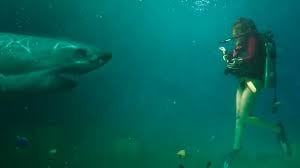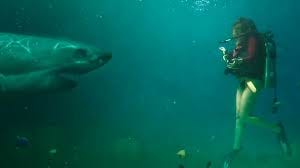Although there were certainly films in which sharks figured into the plot long before the release of Steven Spielberg’s blockbuster adaptation of Peter Benchley’s best-selling novel Jaws—they were a key plot point in the James Bond underwater epic Thunderball (1965) and cult filmmaker Sam Fuller and a pre-superstardom Burt Reynolds teamed up for 1969’s Shark! (though Fuller would try unsuccessfully to get his name removed from that trouble-plagued production)—it was the colossal success of that particular title that would jump-start an entire sub-genre of films ranging from big-budget items to uber-cheesy knock-offs (and I am not even counting the non-shark rip-offs like Piranha and Alligator) that continues on nearly a half-century later. I can’t say that I have seen every film that has attempted to emulate Jaws over the years but Lord knows that I have seen more than my fair share of them and can attest that with a couple exceptions, such as the ingenious Blake Lively thriller The Shallows and the inspired low-budget effort Open Water, most of them have been little more than uninspired retreads of what Spielberg so brilliantly did back in the day. The latest stab at fin-based entertainment is Into the Deep and while it does boast one element clearly designed to make it stand apart from the usual VOD dreck—more about that in a bit—it isn’t enough to help make this anything other than a low-rent and increasingly tedious schlockfest that does nothing for viewers except to make them wish that they were watching Jaws again instead of this foolishness.
As the film opens, we see a young girl named Cassidy being traumatized when she witnesses her beloved father being chewed to death by a great white shark right in front of her eyes. With the aid and tutelage of her oceanographer grandfather Seamus, she is eventually able to conquer her fear of open water, although even as an adult (where she is played by Scout Taylor-Compton), she is still plagued by nightmares about the ocean and the terrors beneath its surface—which seems a little odd, considering that we soon learn that she is now an oceanographer. Anyway, she and her husband, Gregg (Callum McGowan), are setting off on a ship piloted by old friend Daemon (Stuart Townsend) on a diving exploration of a sunken ship rumored to contain a fortune in gold coins. By an amazing coincidence, not only is the wreck apparently located in the same stretch of water as her earlier trauma but it is also the anniversary of that earlier attack.
Sure enough, Cassidy, Gregg and a couple of others along for the ride make the dive and while they do find treasure in the wreck, they also wind up coming across a pair of great white sharks who attack, chomping off the leg of one of them in the process. While they all get back to the ship in time, Stumpy is in imminent danger of bleeding to death so they start to head back when they come across another ship. Thinking that this more modern craft will get them to help quicker than the tub they are currently on, they wave it down to ask that ship’s captain for help. Oops—that ship turns out to be commandeers by a group of pirates led by former Navy SEAL Jordan Devane (Jon Seda) who are out there to recover a fortune in drugs that were dropped on the ocean floor and who force Cassidy to do the retrieval for them, putting her in the middle of the gun-toting thugs hold her friends hostage on the boat and the still-hungry shark lurking about.
To give the film a slight degree of credit, the screenplay by Chad Law and Josh Ridgeway is not merely content to rip off Jaws and everything that it directly inspired—it also borrows big chunks from The Deep (another film based on a Peter Benchley novel), Dead Calm and Captain Phillips, to name just a few, for good measure. However, what it has in sheer nerve, it lacks when it comes to such elements as tension, excitement or basic storytelling. The script consists of a collision of story points that never come close to cohering into a satisfying narrative and characters so cardboard in nature that it is a wonder that they don’t begin to dissolve before our eyes the moment that they get wet. As for the shark attack sequences that would theoretically seem to be the film’s raison d’etre, as it were, they don’t help to enliven things because a.) they prove to be surprisingly few and far between, even for a film clocking in at less than 90 minutes, and b.) the CGI effects deployed to represent both the creatures and the gory havoc they occasionally wreak are so ineptly rendered that they make even the lesser Sharknado sequels feel convincing by comparison.
This is all bad enough but what really kills Into the Deep is the way in which it has been inexplicably structured. As the story goes on, it keeps lurching into flashbacks charting Cassidy’s attempts to recover from her childhood trauma with the aid of her grandfather and, as what is clearly meant to be the element designed to set this apart from other cheapo shark movies, the role of the grandfather is filled by none other than Richard Dreyfus’s, the co-star of Jaws itself making his first appearance in a shark film since the release of that one. The problem isn’t necessarily with these scenes—Dreyfuss does deliver the closest thing to a solid performance in them—but all of these flashbacks are inserted into the main story in such a haphazard manner that not only do they fail to help to bring some kind of additional resonance to the material, the only thing that they accomplish is to completely dissipate whatever meager tension that director Christian Sesma had managed to develop.
The only vaguely memorable aspect to Into the Deep—a film that otherwise makes even the infamous Great White (1981) seem like a hymn to originality by comparison—comes at the very end. As the end credits roll, Dreyfuss pops up on camera to deliver what is essentially an extended PSA attesting to the importance of sharks to our planet’s ecosystem and the threats of extinction that many species have faced in recent years due to causes ranging from overfishing to the ways in which they have been demonized in popular culture. Although the cause is commendable enough, the impact of this statement is somewhat undercut by the fact that it comes at the conclusion of yet another film writing sharks off as bloodthirsty monsters and by Dreyfuss reciting his pitch in a manner that suggests that this was the very first time he was reading these words. As a result, what is presumably meant to be a heartfelt speech attesting to the importance of sharks comes across as merely clumsy and ineptly handled, though to be fair, it is pretty much in line with everything else preceding it.




